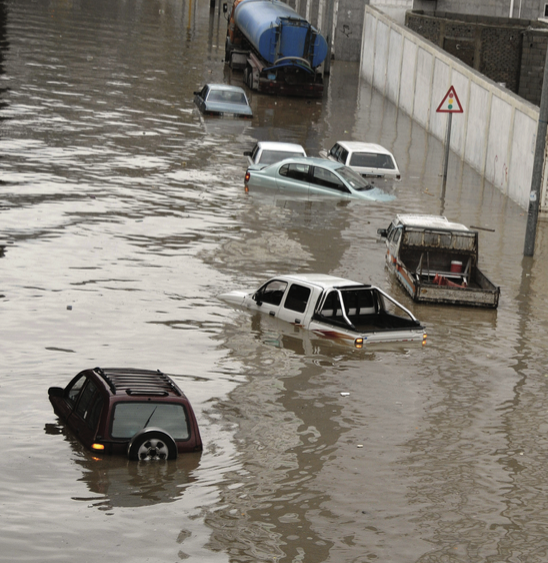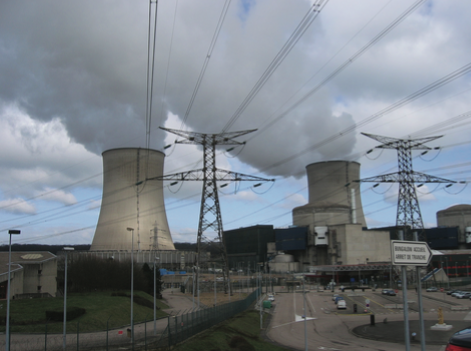| February was an unsettling month in Lebanon and not just on the political front. On February 15, the country experienced a earthquake that registered 5.1 on the Richter scale, according to the Bhannes Center for Seismic and Scientific Research. And although just a few injuries were recorded, it was definitely a reminder that danger can come from other than the political sphere. Every year catastrophes and disasters kill tens of thousands of people around the globe. In 2006, the most recent year for which precise numbers are available, the Zurich based reinsurance giant Swiss Re estimated that 213 manmade disasters and 136 natural catastrophes killed 31,000 people worldwide. |
Earthquakes caused the most damage. In Indonesia alone, two earthquakes claimed 6,600 lives. The financial losses from these events were not small either, amounting to a whopping $48 billion in total. Other natural catastrophes accounted for most of the damage checking in at $11.8 billion, whereas manmade disasters cost $4 billion.
In a world this dangerous it makes sense to have insurance. Yet only one-third of the losses mentioned above had been insured. And in Lebanon, this number would have been much lower — just 20%. This does not bode well for the country as the number of disasters and catastrophes around the world appears to be rising in the long term, putting Lebanon more at risk every year.
Extraordinary risk insurance
Earthquakes are just one type of insurable risk categorized as “extraordinary risk”. This type of insurance covers events that either have high aggregation potential, like the fall-out from a big earthquake, or an exceptionally high probability of occurring, like the assassination of a Lebanese politician.
According to Maroun Corm at the Beirut-based Libano-Suisse Société D’Assurances, there are two main types of extraordinary risk insurance, acts of God and political violence. Acts of God are divided into three aspects: flood, earthquake and tidal wave (tsunami). Usually, all three can be simply added on to a fire policy. Earthquake and tidal wave insurance are often slightly more expensive due to their higher aggregation potential. It is also interesting to note that geographic location within Lebanon does not affect premium rates for earthquake coverage, so cost is the same no matter where you are in the country.
Interviewed by Executive, Jean Hleiss, associate general manager at ADIR insurance, said that although February’s earthquake caused little damaged, now is a good time to purchase earthquake insurance as it is likely reinsurance providers will increase their rates next year. He explained that a typical earthquake add-on to a standard fire insurance policy for a $1 million building would amount to a $500 annual premium.
Political violence insurance
The second type of threat covered by extraordinary risk insurance is political violence, and can also be divided into three groups. The first type, SRCC, protects against strikes, riots and civil commotion. An example of this would be the January 27 riots in Mar Mikhail. Second is insurance against terrorism. The random bombing campaign that targeted Beirut in 2005 best represents this category. The third category is war insurance, which appears to be straightforward at first glance but can be divided into both war and civil war by some insurance companies. Premiums and deductibles for all insurance guarding against political violence are much higher than those for acts of God.
Depending on the company, all three can be purchased separately or as a package and can be added onto a pre-existing standard fire policy. Unlike a standard fire policy, however, premium rates swing wildly. They can range from 1% of the property value up to 10%. As always, it is best to purchase a policy when the political situation is calm to take advantage of lower initial rates. Although premiums do change with the political situation, a long-term client will likely get much more favorable rates when things do go sour. It is also important to keep the higher deductibles in mind, which often start at a minimum of $500,000 for war damages. Other factors are worth considering as well. Location, for example, can affect premium. If your building is next to the headquarters of a political party in Beirut you will certainly pay more due to increased risk.
Due to the significantly higher premiums and deductibles, very few insurance policies, protecting against terrorism and war, are sold. Of the five insurance companies Executive interviewed for this article, three said that they had not sold a policy of this type in the last year and the other two had sold less than 10. This does not keep some insurance companies from advertising, however. For example, Medgulf’s promotional brochure on personal accident insurance has two schemes, Plan A exclusive and Plan B inclusive of passive war coverage.
Assassination insurance
But apart from property, how do people insure themselves against political violence? Again, due to high premiums and deductibles this type of insurance is generally very rare and is usually sold on a case by case basis, in direct contradiction to Medgulf’s plan B system. Hisham Barraj of Arabia Insurance Company explained that his company does not offer a standard coverage because “each person has to assess his own value. A human life is not a material that can be appraised by someone else.”
Libano-Suisse’s Corm said that recently he had written a policy of this type for the chairman of a prominent Lebanese business. The client had himself insured for up to $500,000 against kidnapping, ransom and terrorism (although he is not covered against personal assassination). His premium is 10% of the total insured or $50,000 per year. It is important to note that the rate is not that high because of the client’s job but to the territoriality limit, as he frequently travels to Iraq.
It appears that for some, policies for businessmen headed to Iraq are big business. Hleiss of ADIR said his firm has written no-less than 500 policies in total to insure clients against kidnapping and ransom, and added that from those policies his company had only seen two or three claims. However, those can be costly: ADIR recently paid out $3 million on a claim resulting from an assassination in Beirut.
Read the fine print
Farid Chedid, managing director of Chedid Re, pointed out what a lot of people neglect — the details. He said that one major problem with insurance in Lebanon is that the contracts here are based on European wordings. For example, in Europe a standard SRCC contract specifically states that “rioters” are unarmed people.
Unfortunately, when this standardized contract is used in Lebanon unmodified, damage incurred would often not be covered as it is not unusual for rioters in Lebanon to carry weapons. Therefore, it is important to use an insurance company that is particular about contract wording and has a good reputation for honoring claims.
When looking for a policy, one should also keep exclusions in mind. Most policies will not cover damage incurred during nuclear, chemical or biological attacks, or in a war between any two of the world’s five superpowers.
Of course, for local and regional residents, these particular instances are rather unlikely, and give no reason to avoid purchasing insurance altogether. In fact, with a little bit of common sense and preparation, the astute client will be able to insure himself well against the extraordinary risks of our uncertain world.









